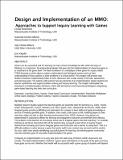| dc.contributor.author | Rosenheck, Louisa D | |
| dc.contributor.author | Gordon-Messer, Susannah | |
| dc.contributor.author | Clarke-Midura, Jody | |
| dc.contributor.author | Klopfer, Eric | |
| dc.date.accessioned | 2017-06-14T14:04:05Z | |
| dc.date.available | 2017-06-14T14:04:05Z | |
| dc.date.issued | 2016 | |
| dc.identifier.isbn | 9781466696297 | |
| dc.identifier.isbn | 9781466696303 | |
| dc.identifier.issn | 2327-1825 | |
| dc.identifier.issn | 2327-1833 | |
| dc.identifier.uri | http://hdl.handle.net/1721.1/109851 | |
| dc.description.abstract | Games can be a powerful tool for learning not only content knowledge but also skills and ways of thinking. In a classroom, the instructional design that goes into the implementation of a learning game is as important as the game itself. The Radix Endeavor is a multiplayer online game for inquiry-based STEM learning in which players explore mathematical and biological systems and use their understanding of those systems to solve problems in a virtual world. This chapter will present case studies of teachers implementing Radix in their classroom with a wide variety of formats, approaches, and learning goals. The authors will examine how key elements of an implementation impact student and teacher experiences and support problem-solving and inquiry learning. The chapter will explain the importance of implementation decisions, which will aid teachers and instructional designers integrating game-based learning into their own curriculum. | en_US |
| dc.language.iso | en_US | |
| dc.publisher | Information Science Reference | en_US |
| dc.relation.isversionof | http://dx.doi.org/10.4018/978-1-4666-9629-7.ch002 | en_US |
| dc.rights | Creative Commons Attribution-Noncommercial-Share Alike | en_US |
| dc.rights.uri | http://creativecommons.org/licenses/by-nc-sa/4.0/ | en_US |
| dc.source | Klopfer | en_US |
| dc.title | Design and Implementation of an MMO | en_US |
| dc.type | Article | en_US |
| dc.identifier.citation | Rosenheck, Louisa, Susannah Gordon-Messer, Jody Clarke-Midura, and Eric Klopfer. “Design and Implementation of an MMO.” Handbook of Research on Gaming Trends in P-12 Education (n.d.): 33–54. | en_US |
| dc.contributor.department | Massachusetts Institute of Technology. Department of Urban Studies and Planning | en_US |
| dc.contributor.department | Massachusetts Institute of Technology. Institute for Data, Systems, and Society | en_US |
| dc.contributor.department | Program in Media Arts and Sciences (Massachusetts Institute of Technology) | en_US |
| dc.contributor.approver | Klopfer, Eric | en_US |
| dc.contributor.mitauthor | Rosenheck, Louisa D | |
| dc.contributor.mitauthor | Gordon-Messer, Susannah | |
| dc.contributor.mitauthor | Clarke-Midura, Jody | |
| dc.contributor.mitauthor | Klopfer, Eric | |
| dc.relation.journal | Handbook of Research on Gaming Trends in P-12 Education | en_US |
| dc.eprint.version | Author's final manuscript | en_US |
| dc.type.uri | http://purl.org/eprint/type/BookItem | en_US |
| eprint.status | http://purl.org/eprint/status/NonPeerReviewed | en_US |
| dspace.orderedauthors | Rosenheck, Louisa; Gordon-Messer, Susannah; Clarke-Midura, Jody; Klopfer, Eric | en_US |
| dspace.embargo.terms | N | en_US |
| mit.license | OPEN_ACCESS_POLICY | en_US |
| mit.metadata.status | Complete | |
